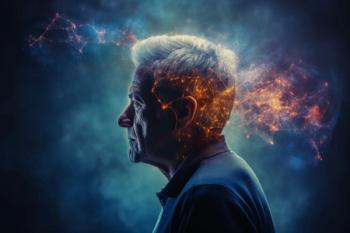
Geriatric Psychiatry Research Update: March 2017
Insights from 3 recent studies on the benefits of mental stimulation for mild cognitive impairment, effect of brain stimulation on memory, and risk of dementia in men with sleep apnea.
The results of 3 new studies in geriatric psychiatry show that mentally stimulating activities may decrease the risk of mild cognitive impairment, targeted noninvasive brain stimulation may combat specific memory impairments, and sleep apnea may increase the risk of dementia in older men without the apolipoprotein E ε4 allele.[1-3] Scroll through the slides for the latest findings and take-home messages.Study 1. Mentally Stimulating Activities May Decrease the Risk of Incident Mild Cognitive Impairment (MCI) in Elderly Persons: A prospective, population-based cohort study included 1929 cognitively normal persons (median age, 77 years at baseline). During a median follow-up of 4 years, playing games, engaging in craft activities, using a computer, and participating in social activities were associated with a decreased risk of incident MCI. For those who carried the apolipoprotein E É4 allele, there were significant associations between decreased MCI risk and computer use or being socially active.[1]Clinical Implications for Study 1: Encourage elderly patients to participate in simple, accessible activities that stimulate the brain.Study 2. Targeted Repetitive Transcranial Electromagnetic Stimulation (rTMS) May Improve the Precision of Memory Recollection: The hippocampal posterior-medial (HPM) network has been implicated in the recollection of highly precise contextual and spatial information. Sixteen healthy adults underwent memory testing about 24 hours before and after HPM network-targeted high-frequency rTMS. The same intensity stimulation was delivered to a site outside the HPM network, which amounted to a sham intervention. Active stimulation led to “highly consistent” improvements in precision of memory recollection, while sham stimulation results were “at chance.”[2]Clinical Implications for Study 2: Noninvasive brain stimulation can enhance reactivation of precise memory details that are often disrupted in those with brain injuries or dementia.Study 3. Sleep Apnea May Increase the Risk of Dementia in Older Men Without the Apolipoprotein E (APOE) ε4 Allele: Some 7547 men without dementia or other active neurological conditions that affect cognition were interviewed at baseline for sleep apnea. The effect of self-reported sleep apnea on dementia risk depended on their APOE É4 status. When the allele was absent, there was a 66% higher risk of developing dementia; whereas there was no additional risk for participants with the APOE É4 allele.[3]Clinical Implications for Study 3: Ask older patients about sleep apnea problems, given the potential association with future cognitive dysfunction.
References:
1. Krell-Roesch J, Vemuri P, Pink A, et al.
2. Nilakantan AS, Bridge DJ, Gagnon EP, et al.
3. Ding X, Kryscio RJ, Turner J, et al.
Newsletter
Receive trusted psychiatric news, expert analysis, and clinical insights — subscribe today to support your practice and your patients.







